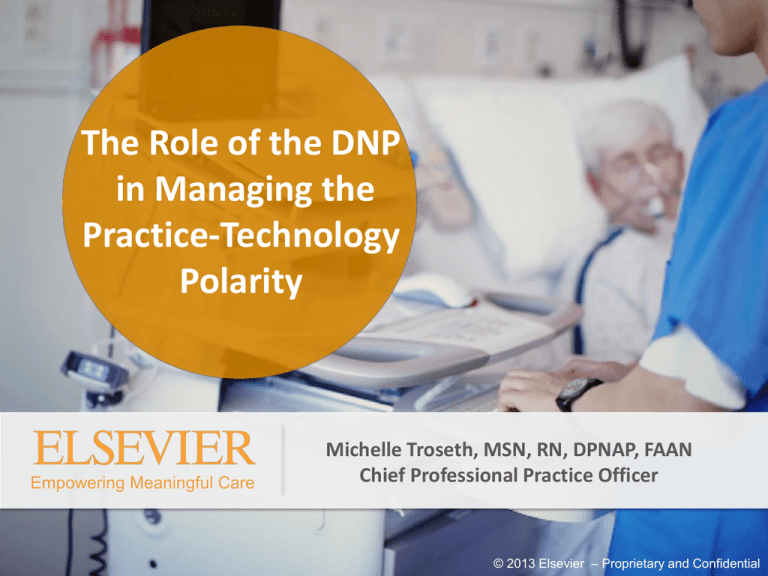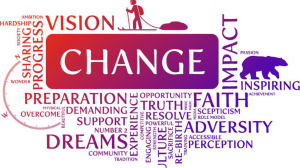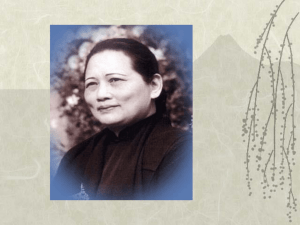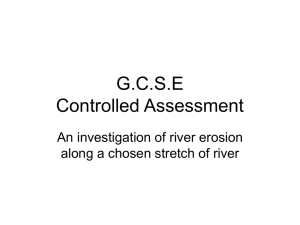
The Role of the DNP
in Managing the
Practice-Technology
Polarity
Empowering Meaningful Care
Michelle Troseth, MSN, RN, DPNAP, FAAN
Chief Professional Practice Officer
© 2013 Elsevier – Proprietary and Confidential
Michelle Troseth, MSN, RN, DPNAP, FAAN
Chief Professional Practice Officer
Elsevier Clinical Solutions
Co-Chair TIGER Initiative Foundation Board of Directors
National Academy of Practice (NAP) – Treasurer, Executive Committee
Nursing Academy Member
Campaign Chair: The Bonnie Wesorick Center for Healthcare
Transformation at Grand Valley State University
Health Policy Committees: Reed Elsevier, AMIA-NWIG, eHI
Distinguished Practitioner - National Academies of Practice (2007); International
Group Recognition Award (CPM Consortium) - National Academies of Practice
(2010); Sigma Theta Tau International Kappa Epsilon At-Large Award for
Excellence in Leadership (2011); Distinguished Alumna Award Grand Valley State
University (2011), Rutgers 15th Recognition Award for Advancing Technology in
Healthcare (2012). Selected Fellow in American Academy of Nursing (2012).
Objectives
• Describe major shifts in healthcare that are
creating exponential growth in technology
• Explain the concept of Polarity Thinking and
the implications for Practice and Technology
working together to achieve a higher purpose
• Identify key ways the DNP role can manage
the Practice and Technology Polarity
Major Shifts in Healthcare
ARRA/
Meaningful
Use
Accountable
Care
Organizations
Interprofessional
Practice and
Education
4
Culture and
Professional Practice
Framework for
Sustainable
Healthcare
A Conceptual Approach to Meaningful Use
Advanced
clinical
processes
Data capture and
sharing
Improved
outcomes
Accountable Care Organizations
Technology Platform
(The Focus)
Clinical
Integration
Medical
Homes
ACO
Population
Decision
Making
Continuum of Care
Practice Platform
(The Afterthought)
Bundled
Payments
Interprofessional Practice and Education
“Health care delivered by well-functioning coordinated teams leads to better patient
and family outcomes, more efficient health care services, and higher levels of
satisfaction among health care providers. We all share the vision of a U.S. health care
system that engages patients, families, and communities in collaborative, team-based
care. This coordinating center will help us move forward to achieve that goal.”
Mary K. Wakefield, Ph.D., R.N.
HRSA Administrator
September 14, 2012
The Digital Generation of Healthcare
Exponential Growth Technology
• Show Video-Clip
Advancing Practice with Technology
Technology must capture
the tasks performed but
not limit practice
to the rituals and routines
of traditional practice
Tasks
Technology must be
designed to enhance
scope of practice and
evidence-based practice
at the point of care
Scope of
Practice
Technology
is key to embrace
and shape so
practice is truly
knowledge-driven
KnowledgeWorker
Wesorick, Troseth & Cato (2004) Intentionally Designed Automation. Healthcare Technology (vol. 2)
McBride (2005) Nursing and the Informatics Revolution. Nursing Outlook.
“There is no aspect of our profession that will be
untouched by the informatics revolution in progress.”
Angela McBride
Distinguished Professor and University Dean Emeriti
Indiana University School of Nursing
Framework for Sustainable Healthcare
Transformation
• Intentionally designed
• Evidence-Based
• Action oriented
• Outcome Producing
• Replicable
• Capacity building
• Technology enabled
• Scalable
Grounding Principles
The CPM Framework™
THE PRINCIPLES OF PARTNERSHIP
THE PRINCIPLES OF DIALOGUE
THE PRINCIPLES OF POLARITY
Principles of Polarity
• Polarities are interdependent pairs of
different, competing, or opposite values or
points of view
• Polarities are all around us and are unsolvable,
indestructible and unavoidable
• Polarities are about “both/and” thinking,
rather than “either/or” thinking
• Each polarity has an identified upside (values)
and downside (fears)
Principles of Polarity (con’t)
• Polarities can be managed well over time to
experience the upside and dynamic
interdependencies of each pole, and to
achieve a higher purpose
•Rooted in Polarity Management™ (Johnson, B. 1996)
Navigating the Waters of
Practice and Technology
• Requires new skills
• Requires new ways of thinking
Copyright © 2009, CPM Resource Center, an Elsevier business. All rights reserved.
A Key Life Preserver for DNP Leaders
TM
TM
www.polaritypartnerships.com
www.cpmrc.com/polaritythinking
18
Polarity Thinking™: Essential Skill for Healthcare Leaders
What is a Polarity?
Polarities are interdependent pairs of
different/competing/opposite values or points of view.
Why is it so important?
They need each other, they are interdependent.
Polarities are all about relationships.
Why is it so important?
They need each other to achieve higher purpose, they are
interdependent
•Problem Solving is about
“either/or”
•Polarity Thinking is about “both
and /and”
Why is polarity thinking so
important today?
When leaders are not able to differentiate
problems to be solved from polarities that need
to be managed there is wasted time, money,
energy and the inability to achieve improved,
sustainable clinical outcomes.
“The first accountability of a leader
is to know reality.”
~Max Depree
Navigating Realities
• We have seen reality through the lens of problems
not through the lens of problems and interdependent
opposites.
• The skill of polarity management supports a whole
new way of thinking and acting.
SEE (identify) the
polarity
MAP the
polarity
MapM
TAP the energy in the
polarity to move to
Action.
Polarities – from vision
to reality
Polarity Management® Map
Greater Purpose Statement (GPS) * - why balance this polarity?
Live
Values = positive results from focusing on
the left pole
Value-upside
**
Value-Upside
Get oxygen
Inhale
Values = positive results from focusing on
the right pole
Clean Out Carbon
Dioxide
Exhale
and
Increased Carbon
Dioxide
Too Little Oxygen
Fears = negative results from over-focusing
on the left pole to the neglect of the right pole
Fears = negative results from over-focusing
on the right pole to the neglect of the left pole
Die
Deeper Fear from lack of balance
Polarity Map © 1992, 2008 Polarity Management Associates, LLC
Copyright © 2009, CPM Resource Center, an Elsevier business. All rights reserved.
Basic Action Steps to Manage a Polarity Well Over Time
Action Steps
How will we gain or maintain the positive
results from focusing on this left pole?
What? Who? By When? Measures?
1.
Higher Purpose = Why Balance This Polarity?
Positive results from focusing on this
left pole:
*
** Positive results from focusing on this
right pole:
Action Steps
How will we gain or maintain the positive
results from focusing on this right pole?
What? Who? By When? Measures?
1.
Always tension between them
Early Warnings***
Measurable indicators (things you can count)
that will let you know that you are getting into
the downside of this left pole.
INHALE
Negative results of over-focusing on
this left pole to the neglect of the
right pole:
EXHALE
and
Early Warnings
Negative results of over-focusing on
this right pole to the neglect of the
left pole:
1.
Deeper Fear from Lack of Balance?
Copyright © 2009, CPM Resource Center, an Elsevier business. All rights reserved.
Measurable indicators (things you can count)
that will let you know that you are getting
into the downside of this right pole.
1.
Greater purpose
Upside
Values
Upside
Values
Pole
Pole
Downside
Fears
Downside
Fears
Deeper fear
A Tool to Visualize Polarities by Barry Johnson, PhD
Stability
Change
Basic Action Steps to Manage a Polarity Well Over Time
Action Steps
How will we gain or maintain the positive
results from focusing on this left pole?
What? Who? By When? Measures?
1.
Higher Purpose = Why Balance This Polarity?
Early Warnings***
Measurable indicators (things you can count)
that will let you know that you are getting into
the downside of this left pole.
** Positive results from focusing on this
Positive results from focusing on this
left pole:
Stability
*
right pole:
Early Warnings
Negative results of over-focusing on
this right pole to the neglect of the
left pole:
1.
Deeper Fear from Lack of Balance?
Copyright © 2009, CPM Resource Center, an Elsevier business. All rights reserved.
How will we gain or maintain the positive
results from focusing on this right pole?
What? Who? By When? Measures?
1.
Change
and
Negative results of over-focusing on
this left pole to the neglect of the
right pole:
Action Steps
Measurable indicators (things you can count)
that will let you know that you are getting
into the downside of this right pole.
1.
Basic Action Steps to Manage a Polarity Well Over Time
Action Steps
How will we gain or maintain the positive
results from focusing on this left pole?
What? Who? By When? Measures?
1.
Higher Purpose = Why Balance This Polarity?
** Positive results from focusing on this
Positive results from focusing on this
left pole:
right pole:
ContinuitySense of
Direction
Stability
Early Warnings***
Measurable indicators (things you can count)
that will let you know that you are getting into
the downside of this left pole.
*
Action Steps
How will we gain or maintain the positive
results from focusing on this right pole?
What? Who? By When? Measures?
1.
New Energy
New Possibilities
Change
and
Negative results of over-focusing on
this left pole to the neglect of the
right pole:
Early Warnings
Negative results of over-focusing on
this right pole to the neglect of the
left pole:
1.
Stagnation
Deeper Fear from Lack of Balance?
Copyright © 2009, CPM Resource Center, an Elsevier business. All rights reserved.
Chaos
Measurable indicators (things you can count)
that will let you know that you are getting
into the downside of this right pole.
1.
34
Sustainable Transformation
A. Ensure users understand
the design, purpose and
functionality of technology
tool.
B. Provide time for users to
learn the technology tool
properly.
Innovation
Standardizes and
integrates information
Increase efficiency
Data retrieval
Technology
A. Timelines for activation are
all about technology, not
about practice transformation
B. Modifying or deconstructing
evidence-based content
integration.
Lack of evidencebased information
Design interferes
with integration
Lack of
“humanization”
EBP and
professional
practice/workflow
Clinical integration
across disciplines
Caring culture
A. Create and support time for
interdisciplinary team to do
transformation work needed
to integrate evidence-based
professional practice
B. Provide processes and tools
to embed into technology:
EBP, scopes of practice, &
integrated workflow.
Practice
Lack of awareness of
tech. benefits
Lack of information
impacts quality
Decrease timely access
& retrieval of patient
information
Unsustainable Transformation
Polarity map showing the practice and technology poles
and ways to balance the tension between them.
A. Users demand that
technology not change what is
familiar (e.g. documentation
practices)
B. Comments about the fear
that technology will
dehumanize care and dictate
practice.
Key points about how polarities
“work”
• Both sides of the polarity are important.
• Most of us have a preference for one side or the
other.
• The more strongly you are attached to one side, the
harder it is to see the downside.
• Polarities are interdependent pairs that need each
other over time in order to sustain both sides.
Key points about how polarities
“work”
• Polarity thinking helps us understand another person’s point
of view.
• One sided thinking leads to accuracy without completeness.
You may be accurate, but not complete in your view.
• Forcing others to come over to your point of view is likely to
create feelings of resistance and resentment.
• Confirming someone else’s accuracy increases the possibility
they will supplement it with yours.
• The challenge is to find the “rightness” in the other point of
view.
Key points about how polarities “work”
• If you over focus on one and neglect the other side,
you will get the downside of the one you focus on.
• If you want to guarantee failure of a change effort,
tie it to one pole of a polarity.
• When dealing with a polarity, the smaller the
minority voice, the more important it is to pay
attention to that voice.
• The oscillation between poles is ongoing. The
natural tension between both sides is unavoidable,
unsolvable, indestructible, and can be tapped.
All of the DNP’s in this room are leaders for transformational change
for Practice & Technology
The challenge of leadership is to be strong, but not rude;
be kind but not weak;
be bold, but not bully;
be thoughtful, but not lazy;
Be humble, but not timid;
be proud, but not arrogant;
have humor, but without folly
~Jim Rohn
Polarity Thinking teaches us how to live this everyday
Open Dialogue
In what ways can the DNP role in support
evidence-based, professional practice in a
technology driven world?
www.polaritypartnerships.com
www.cpmrc.com/polaritythinking
@CPMRCmichelle
m.troseth@elsevier.com
References
•
Abrahamson K., Arling P., Wesorick B., Anderson J. (2012). An application of the socio technical systems
approach to implementation of electronic evidence into practice: The Clinical Practice Model framework.
International Journal of Reliable and Quality E Healthcare, 1(1). 13-20. January-March.
•
Clancy, T (2009). Improving patient safety, increasing nursing efficiency and reducing cost through
technology supported pull systems. IN: C. Weaver, R. Carr,, C. Delaney,(et al.) (Eds.), Nursing and
informatics for the 21st century: An international look at practice, trends, and the future. (2nd ed.).
Chicago, IL: HIMSS Publications.
•
Elsevier CPM Resource Center (2011). The CPM Framework™: culture and professional practice for
sustainable healthcare transformation. (Brochure). Grand Rapids, MI.
•
Hinton-Walker P., Troseth M. (2010). Business coalition: Shaping health reform through technology and
science. In: Cowen PS, Moorhead S, (Eds.), Current Issues in Nursing, (8th ed., 438-448). St. Louis: Mosby,
Elsevier.
•
Johnson, B. (1996). Polarity Management: Identifying and managing unsolvable problems. Amherst, MA:
HRD Press.
•
References (con’t)
•
Staggers, N. & Troseth, M. (2011). Usability and clinical application design. In Ball, M., Troseth, M. et al
(Ed.). Nursing Informatics: Where Caring and Technology Meet 4th Edition. Springer.
•
Troseth, M. (2012). Informatics & the Future of Nursing Practice. Advance for Nurses. April 27, 2012.
•
Troseth, M. (2011). The TIGER Initiative. In McCormick and Saba (Ed.). Essentials for Nursing Informatics
5th Edition (in progress of publication). Chapter 27. McGraw Hill.
•
Wesorick, B., & Doebbeling, B., (2011). Lessons from the field: The essential elements for point-of- care
transformation. Medical Care, 49(12), Suppl 1, S49-S58.
•
Wesorick, B., Troseth, M., Cato, J. (2004). Intentionally designed automation creates the best places to
work and receive care. In Health care technology: Innovating care through technology, 2. San Francisco:
Montgomery Research, Inc.
•
Wesorick, B (2013). Essential steps for successful implementation of the EHR to achieve sustainable, safe,
quality care. In A. Moumtzoglou & A. Kastania (Eds.), E-Health Technologies and Improving Patient Safety:
Exploring Organizational Factors (pp. 27-55).












